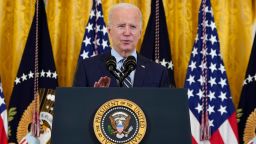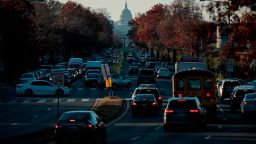In his order blocking the Biden administration’s health care worker vaccine mandate, US District Judge Terry Doughty spent several sentences laying out – without criticism – the claims of a doctor who falsely said that the Covid-19 vaccine was not effective in preventing transmission of the disease.
Left unmentioned in Doughty’s opinion was that the doctor’s views on the vaccines are so outside the mainstream that the health care system that once employed him sought a temporary restraining order because it claimed the doctor was improperly associating himself with it.
The invocation of a well-known vaccine skeptic is just one example of how federal judges have played down the seriousness of the pandemic while playing up supposed uncertainties about the effectiveness of vaccines.
They’ve done so in an onslaught of courts orders across the country – all issued by Republican-appointed judges, and several by former President Donald Trump – that have frozen nationwide all three major vaccine mandates that the Biden administration sought to implement as fears about the Delta variant collided with winter flu season.
The cases themselves generally raise legal issues distinct from the federal government’s scientific conclusions. But in many of the cases, doubts about the seriousness of the coronavirus and whether vaccines are effective in limiting its spread have seeped into the opinions, as the judges have taken it upon themselves to explain why their scientific assessments should trump those of government scientists.
The trend cuts against centuries of American law that instruct judges to “be deferential to elected officials and the scientific experts who advise them on matters of public health emergency response,” said Lindsay Wiley, a public health law professor at the American University Washington College of Law.
“[A]s the state of emergency has dragged on and the response has become extremely politicized, some judges have become more confident in their own ability to weigh the scientific evidence,” Wiley told CNN in an email, “even to the point of rejecting widespread scientific consensus and cherry-picking testimony from doctors whose expertise is of questionable relevance and whose views are clearly on the fringe.”
The administration’s requirement – via the Occupational Safety and Health Administration – that large companies subject their employees to vaccine requirements or regular testing was the first to be blocked by a court, with a scathing opinion from the extremely conservative 5th US Circuit Court of Appeals.
The opinion, written by Judge Kurt Engelhardt, a Trump appointee, took a dismissive tone toward the government’s reasoning for imposing the policy. It said the “mandate’s stated impetus” was “a purported ‘emergency’ that the entire globe has now endured for nearly two years” – a reference to a dissent by Justice Neil Gorsuch that warned of the risks to civil liberties “when governments proclaim indefinite states of emergency.” In the OHSA case before the 5th Circuit, the administration had argued that coronavirus’ risks had “changed meaningfully” in recent months, as Covid-19 – with the rise of the Delta variant – had grown “more virulent” and because “voluntary safety measures proved ineffective.”
Nonetheless, the 5th Circuit said it “remains unclear that COVID19—however tragic and devastating the pandemic has been—poses the kind of grave danger” contemplated by the relevant law – rhetoric that has since by mimicked by other courts that have blocked various mandates.
The court didn’t need to strike that tone in order to reach the outcome that it did, according to Wendy Parmet, a law professor who’s the director of Northeastern University’s Center for Health Policy and Law, adding that there were other legal issues in the case on which the circuit could have hung its decision to block the mandate.
“The language as a whole expresses – I think – a skepticism of the severity of the pandemic and whether this is a problem that’s really of urgency,” she said, adding that the linguistic approach was that of “Covid minimalization.”
“It’s approaching a stance that feels like the court is adopting the language and the rhetoric of the culture wars as opposed to the ‘this is a lawyerly, boring administrative law decision,’ ” she said.
‘Misreading’ assessments from government scientists
A federal judge in Missouri who was the first to rule against the health care worker mandate used the words of the federal government against it to conclude that the Biden administration lacked evidence that vaccination status affected transmission of the virus. There is, in fact, a great deal of evidence showing vaccines reduce transmission of the virus while reducing deaths and rates of hospitalization.
The Trump-appointed judge, US District Judge Matthew Schelp, derived the conclusion from a line in the regulatory filing unveiling the health care worker rule, which was to be implemented by the Centers for Medicare and Medicaid Services. The regulatory filing noted “uncertainties” about the current Covid variants and said “the effectiveness of the vaccine to prevent disease transmission by those vaccinated are not currently known.”
The line about came in a section of the regulatory filing where the agency was explaining why it couldn’t fully quantify the impact of the rule as it was estimating the policy’s costs and benefits. The regulatory filing had spent several paragraphs laying out evidence that the vaccine does decrease transmission risk. The agency stressed that by preventing people from being infected with Covid in the first place, the vaccines reduced the amount of transmission.
University of California-Hastings College of Law Professor Dorit Reiss said it was “highly disingenuous” and “misleading” for Schelp to use the regulatory language the way he did.
“The CMS said clearly, the vaccines decreased transmission and harm, then added, we don’t know exactly how much. That’s basically what the language is saying,” Reiss told CNN.
An appellate judge considering a separate Florida challenge to the health care worker mandate borrowed much of Schelp’s reasoning in a dissent from an 11th Circuit majority opinion declining to block the mandate. (The 11th Circuit decision came down after the mandate had been blocked nationwide by Doughty’s opinion, and it did not have the effect of reinstating the policy).
The dissenter, Trump appointee Judge Barbara Lagoa, included in a footnote a mention of the new Omicron variant, which had not been discussed in the case.
Claiming that the new variant was “potentially able to avoid the protection provided by the currently available COVID-19 vaccines” she said that Omicron’s emergence showed how the supposed “uncertainties” about the vaccine’s effectiveness cut against the public interests of keeping the mandate in place.
The two judges in the appellate panel’s majority – both Democratic appointees– called Lagoa out for “speculation” and for her failure to cite anything in support of the assertion.
‘Problematic’ use of claims well outside the mainstream
Biden’s mandates have been challenged under administrative laws that allow courts to examine an agency’s procedure in rolling out the challenged policies.
However, according to Georgetown University health law professor Lawrence Gostin, standard administrative law principles call for the courts to “give deference to the agency’s facts and interpretation of its powers.”
The courts in the federal mandate cases have “merely substituted their opinions for those of career agency scientists,” Gostin told CNN in an email. “That is not following the rule of law or precedent.”
Reiss said it was especially an issue that the courts weren’t giving deference to the agencies at the early stage that these cases are in, before they have been fully litigated.
“Basically, the court is saying, ‘The agency is an expert. The agency has experts. But we believe these experts instead,’ even though they haven’t been interrogated in court,” Reiss said.
The Justice Department, for instance, did not have a chance to interrogate the doctor whose assertions about vaccines were cited by Doughty as he blocked the health care worker mandate nationwide.
Doughty summed up that in the viewpoint of the doctor, Peter McCollough, “COVID-19 vaccines do not prevent transmission of the disease among the vaccinated or mixed vaccinated/unvaccinated populations, and that mandatory COVID-19 vaccines for hospitals do not increase safety for employees or hospital patients.”
Doughty – a federal judge in Louisiana who was appointed by Trump – cited those false assertions as a reason that it made “no sense” for the agency’s policy to mandate vaccines without other alternatives.
In its filings, the Justice Department had said the evidence “overwhelmingly” pointed to the conclusion “that health care staff vaccination is highly effective in preventing transmission among health care workers, and from the workers to patients.”
“Studies have also shown that vaccinated people with breakthrough infections may be less infectious than unvaccinated individuals with primary infections, resulting in fewer opportunities for transmission,” the administration had told the court.
McCollough is a go-to doctor for critics of vaccine mandates and has testified before legislatures, while also making frequent media appearances. But his fringe opinions about Covid-19 vaccines have prompted his former employer, a Texas health care system, to take aggressive steps to distance itself from the doctor. Earlier this year, the provider Baylor Scott & White Health filed a lawsuit claiming that McCollough had violated a separation agreement from the hospital by allegedly continuing to associate himself with the network.
(McCollough has denied in the case that he violated the agreement.)
“Dr. McCullough has promoted things that can be fairly described as anti-vaccine misinformation. And he does so in the quoted passages in this case as well,” Reiss, the UC-Hastings law professor, told CNN. She said it was “highly problematic” that the judge was drawing from his declaration in the case.
(CNN reached out to McCollough and his lawyers in the Baylor case for comment for this story. His lawyers told CNN that they “vehemently” objected to the characterization of McCollough as anti-vaccine. In the declaration McCollough filed in the Louisiana case, he said falsely that the Covid-19 vaccines “are not safe generally,” that their “risks outweigh the benefits for the majority of the population” and that they do not prevent transmission of the disease among vaccinated people.)
“This is just one clear example of deeply flawed legal reasoning,” Gostin told CNN. “It’s absurd to [give] weight to a given doctor’s opinion, especially when that opinion is so at odds with both agency scientists as well as the clear consensus of scientific opinion, including CDC recommendations.”







